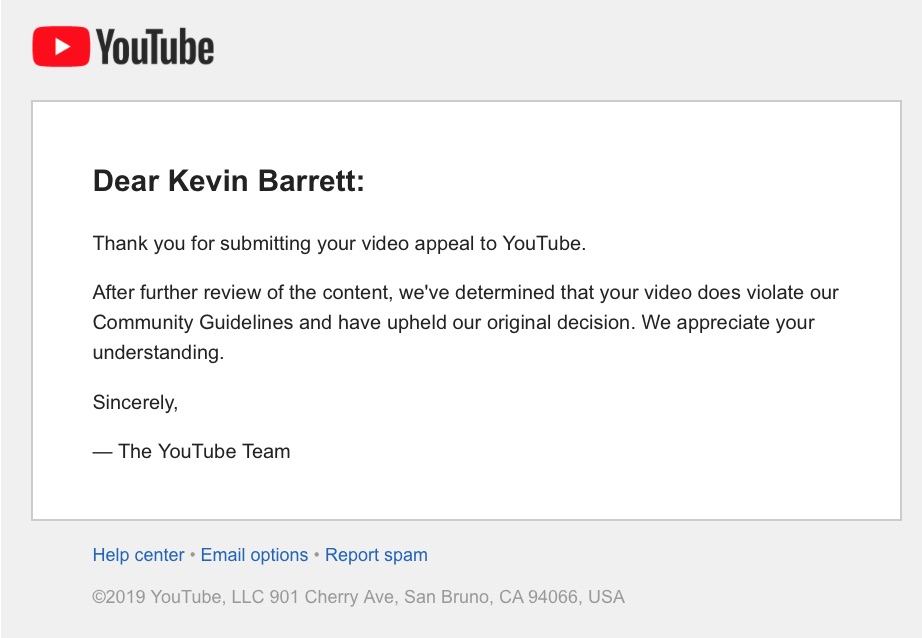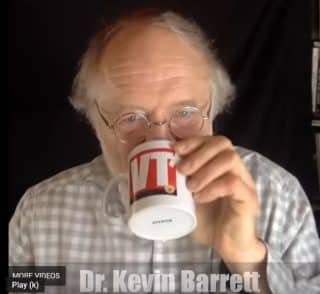
By Kevin Barrett, VT Editor
What do you do when an internet oligarch destroys everything you’ve been working for, obliterates more than a decade of your hard work, and deprives you of the ability to make a living—all because that oligarch disapproves of your free political speech that is explicitly protected in all public places, including today’s digital town square, by the First Amendment?
Obviously that oligarch deserves to be executed for treason. The First Amendment is the heart of our Constitution, and traitors to the Bill of Rights are the worst treasonous scum imaginable.
But since I am a nonviolent person, and would never dream of prosecuting and executing a poor cuddly little internet oligarch, I have decided to forget about alternative journalism and instead open up a T-Shirt business. Below are just a few of the communications from YouTube that gave me this million-dollar idea, along with pictures of my latest merchandise.
|


|
Hi noliesradio, Your video False Flag Weekly News 03/22/2019–New Zealand False Flag? was flagged to us by the YouTube community. Upon review, we have placed restrictions on how the video will be shown. Please note that your video will continue to be available on YouTube. Video content restrictions We believe in free expression, even when that expression is unpopular or potentially offensive to some viewers. In some cases, flagged videos that do not clearly breach the Community Guidelines but whose content is potentially controversial or offensive may remain up, but with some features disabled. This includes videos denying that a well-documented, violent event took place. Your video will be shown after a warning message. In addition, certain features such as comments, sharing, thumbs up, and suggested videos have been disabled. Your video is also ineligible for monetization. For more information, please visit our Help Center. How you can respond While this is not a strike on your account, we still want to hear from you if you believe this was a mistake. If you would like to appeal this decision, please submit this form. You can also appeal directly from Video Manager. Our team will thoroughly review your appeal and will contact you again soon. Sincerely, |
||
|
Help center• Email options• Report spam
|
|
©2019 YouTube, LLC 901 Cherry Ave, San Bruno, CA 94066, USA
|







Dr. Kevin Barrett, a Ph.D. Arabist-Islamologist is one of America’s best-known critics of the War on Terror.
He is the host of TRUTH JIHAD RADIO; a hard-driving weekly radio show funded by listener subscriptions at Substack and the weekly news roundup FALSE FLAG WEEKLY NEWS (FFWN).
He also has appeared many times on Fox, CNN, PBS, and other broadcast outlets, and has inspired feature stories and op-eds in the New York Times, the Christian Science Monitor, the Chicago Tribune, and other leading publications.
Dr. Barrett has taught at colleges and universities in San Francisco, Paris, and Wisconsin; where he ran for Congress in 2008. He currently works as a nonprofit organizer, author, and talk radio host.
ATTENTION READERS
We See The World From All Sides and Want YOU To Be Fully InformedIn fact, intentional disinformation is a disgraceful scourge in media today. So to assuage any possible errant incorrect information posted herein, we strongly encourage you to seek corroboration from other non-VT sources before forming an educated opinion.
About VT - Policies & Disclosures - Comment Policy






Your argument would only make sense if YouTube did not use any public communications infrastructure in its business.
Take notice that the way the First Amendment is worded does not enumerate freedom of speech, assembly, press or religion as positive rights that people possess, but rather as activities the national legislature may not infringe upon. Notice also that no such stricture applies to either the Executive or the Judicial branches, or to any state or local government, or to any non-governmental entity.
If Bill of Rights author James Madison had meant to stipulate them as positive “rights” all he had to do was write it that way, but he did not. Since anti-federalists flatly refused to ratify the Constitution unless it guaranteed something, Madison had to come up with something resembling guarantees. In fact Federalists did not believe a Bill of Rights was necessary, or even good idea, with Alexander Hamilton arguing a Bill of Rights would even be “dangerous.” Originally, 125 proposed amendments were presented to the First Congress to enumerate the rights of the new republic’s citizens; only the ten we are familiar with were passed on to the states to approve. The record of the contentious debates in Congress on these measures is recommended reading for an understanding of what ideas and ideals these men really held.
A website is a publisher. It is morally and legally responsible for every word it publishes. It can publish or withhold anything it chooses. It doesn’t have to even allow readers to comment.
A platform like YouTube, Facebook, Twitter, etc. is not a publisher. It is a de facto monopoly and a digital town square, open to anyone. It exercises no publishers’ oversight over what users post. The users are the publishers, and they are the ones legally responsible for what they post. If they violate the law, sue or prosecute them. Otherwise leave them alone. Their political speech is protected under the First Amendment.
Censorship of the digital town square by internet oligarchs is the worst crime against the Constitution, the worst act of high treason, in all of American history.
Kevin,
Where is the link to order my T shirt?
Are they also available in black?
Comments are closed.